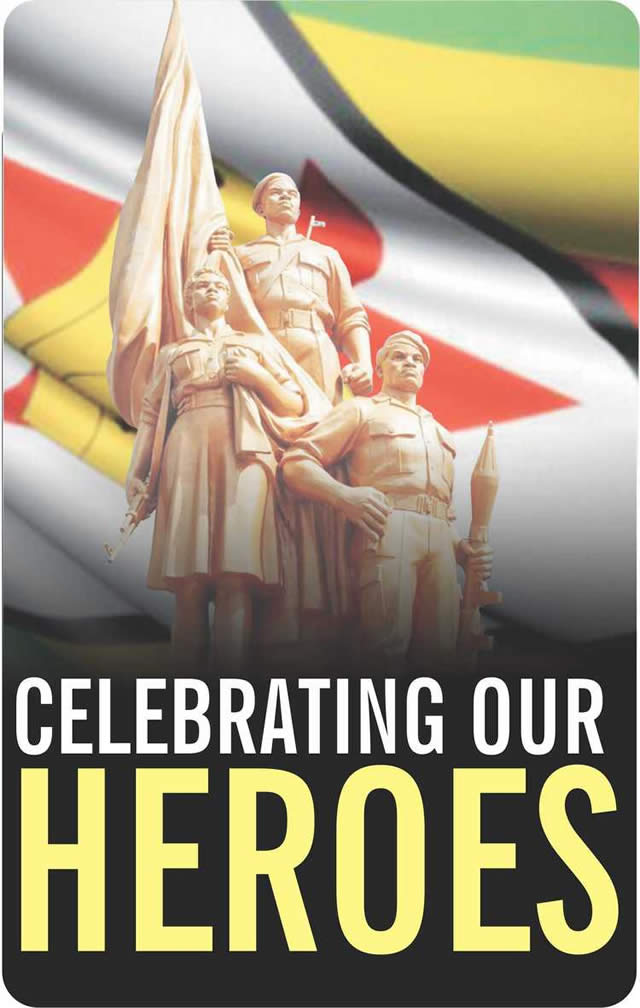Lt Col Harold Chirenda: A war hero

Political Writer
Lieutenant Colonel Harold Mtandwa Chirenda (Retired), was a liberation war icon who was born on August 1 1944 and passed on at the United Bulawayo Hospitals on 1 January 2014 after a long illness. The late Cde Chirenda, nom-de-geurre Elliot Masengo, was born in Mbare, Salisbury (now Harare) to Benand Anna Chirenda from Seke Communal Lands. Cde Chirenda attended Shingirayi Government School in Mbare between 1950 and 1956 where he did Standards 1 to 6.
During the years 1957 to 1962, he enrolled at Fletcher High School and completed Ordinary Level attaining a Cambridge University Certificate. Upon leaving school, he did a research titled “Operation in Feira and Chirundu: Reflections on the Futility of the Rhodesian Security Forces”.
He later obtained a certificate in Business Management at Elangeni Training Centre in Bulawayo. Outraged by the racially inspired inequalities that where a colossal feature of the white settler regime, Cde Harold Chirenda became politically active in 1964 and subsequently crossed the border to join the Zimbabwe African People’s Union (ZAPU). He was recruited into the ZAPU Military Wing Special Affairs in December the same year in Ndola, Zambia.
The late hero became one of the first group of 19 cadres to be sent to Kasr El Boughari in Algeria for basic military training. In 1965, he was selected to enrol for an Officer Cadet Course at Cherchel Military Academy graduating in 1966 and later trained as a Commando.
He became one of ZIPRA’s highly trained officers together with Cde Alfred Nikita Mangena who later became the ZIPRA Commander, Cdes Lookout Masuku, Tapson Sibanda (Gordon T. Munyanyi), Ray Mutema, Sango, Pondayi, Naison Khezwane, Tswarai, Jordan Campu, Ambrose Mutinhiri, Albert Nxele, Cain Materna, Stanley Nleya and many others.
It was at Cherchel Military Academy where he got acquainted with Cdes Samora Machel and Ali Halimeh, the former Palestine Liberation Organisation (PLO) Ambassador to Zimbabwe as well as Yoweri Museveni, the Ugandan President, who were doing the same military training.
Cde Chirenda’s outstanding performance on training led to his appointment as a military instructor at the ZIPRA Morogoro Training Camp in Tanzania in 1967 where he taught Field Engineering, Guerrilla Warfare and Topography.
During this period, Cde Chirenda is commended for having trained and produced some of Zimbabwe’s great military personalities including the late former Army Commander, General Solomon Mujuru and General Jevan Maseko, Cde Obert Mpofu, Brigadier General Abel Mazinyane (Rtd), Cdes Stanley Nleya and Masala Sibanda among others.
While in Zambia, Cde Chirenda initiated some sabotage missions in Rhodesia. The first infiltration was in 1972 where he was accompanied by Cdes Kheli Malaba and Joshua Moyo and their mission was to explode the Chirundu Sugar Estates water engine.
After the transition from the ZAPU Military Wing to ZIPRA in 1972, Cde Masengo was appointed Deputy Chief of Personnel and Training until 1976 when he became the Chief of Training. It was during this time that he was involved in the second infiltration into Rhodesia crossing Kazungula with Cde Cephas Cele.
Cde Chirenda’s exploits and dedication to duty saw him being appointed substantive Director of Training within the ZIPRA High Command joining other directors, that included Cdes Lookout Masuku (Commissar), Ambrose Mutinhiri (Chief of Staff), Report Mphoko (Logistics), Cephas Cele (Personnel), John Dube (Operations), Tapison Sibanda (Military Intelligence) under Cde Nikita Mangena who was the Commander.
Travelling in the same convoy, Cde Chirenda survived a landmine blast which claimed the life of Cde Nikita Mangena in 1978. Cde Chirenda’s leadership qualities, training and patriotism in the Struggle prompted his appointment to the post of ZAPU Chief Representative in Bucharest (Romania) in 1978, a position he executed with high esteem and excellence till Independence in 1980.
His responsibilities included gathering material and political support for the Liberation Struggle. The late hero was among the Patriotic Front (PF) delegation that attended the Lancaster House Conference in London in 1979.
It was the same year that he married Florence Ngwenya in Bucharest, the daughter of Cde Joseph Mtshumayeli Ngwenya. Cde Chirenda was attested into the Zimbabwe National Army (ZNA) on 1 March 1981 as a Lieutenant Colonel and was later appointed Chief Instructor at the Zimbabwe Military Academy (ZMA) in 1982.
He was later appointed General Staff Officer (GSO) Grade 1 (Operations) and in that post worked closely with the British Military Advisory and Training Team (BMAATT) in the integration exercise.
His responsibilities included the interpretation and execution of the Army Commander’s Training Directives and the administration and supervision officers and men. Lt Col Chirenda authored operational order “Sledgehammer” which marked the beginning of the involvement of the Zimbabwe Defence Forces in the Mozambican Campaign in 1982.
In 1983, he was appointed GSO 1 Sports at the Directorate of Army Training and became the first Zimbabwe Defence Forces Chief Delegate to the International Military Sports Council (CISM).
In that capacity, Lieutenant Colonel Chirenda successfully lobbied for the admission of the Zimbabwe Defence Forces into the world military sports organisation in Lagos, Nigeria.
Lt Col Chirenda was a founder member of the Black Rhinos Football Club in 1983 when the Defence Forces team joined the Zimbabwe Football Association (ZIFA) Division One before being promoted to the then Super League the following year.
Together with the late General Solomon Mujuru, they were so passionate about Black Rhinos becoming a successful team and this earned Cde Chirenda the nickname “Go Bhora.” It was during his tenure as GSO 1 Sports and Chairman of Black Rhinos that the team lifted the League title leading to its participation in the African Club Championship games eventually losing to US Goree of Senegal in the semi finals and that was history for Zimbabwe football.
In 1986, Lt Col Chirenda became the Commanding Officer 43 Infantry Battalion and during his tour of duty with the battalion, he took part in Operation Chipoko. This was a joint operation by Commando, 2 Parachute, and 43 Infantry battalions that dealt a major blow to RENAMO’s fighting capability south of the Beira Corridor in the area of Espungabeira.
In 1988, he was posted back to the Directorate of Army Training as GS01 Sports. In 1990, Cde Chirenda was attached to the Ministry of Foreign Affairs and posted as military attaché to Zimbabwe’s High Commission in Botswana, also covering Angola and Namibia. He served in that capacity until April 1994 when he returned home to assume other responsibilities in the Zimbabwe National Army.
During his illustrious career, the late hero was decorated with several medals and awards including: Independence Medal, Liberation Medal ‘Silver’, Long Service Medal (15 years) and the Mozambique Campaign Medal. In addition, he was also a recipient of the Republic of Algeria’s 50th Anniversary Independence Medal.
Cde Chirenda retired from the Zimbabwe National Army in 1995. In recognition of his illustrious service during the liberation struggle and after Independence, the ZANU PF Politburo unanimously declared Cde Chirenda a National Hero.
At the time of his death, he was survived by wife Florence, nine children and 18 grandchildren.









Comments